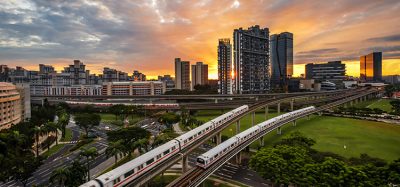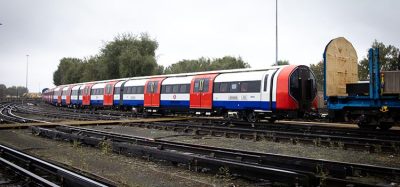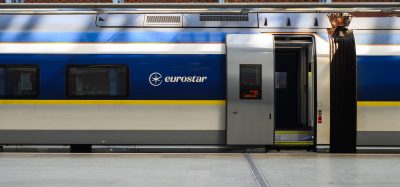The people behind the wheel: Daniel Beutler’s story, Transreport
Posted: 23 October 2024 | Daniel Beutler - Transreport | No comments yet
In the latest instalment of ‘The people behind the wheel’ series, Daniel Beutler, Chairman of Transreport, spoke to Global Railway Review’s Halimah Haque about his career journey, his passion for inclusive transportation and the role innovation plays in shaping the future of the rail industry.
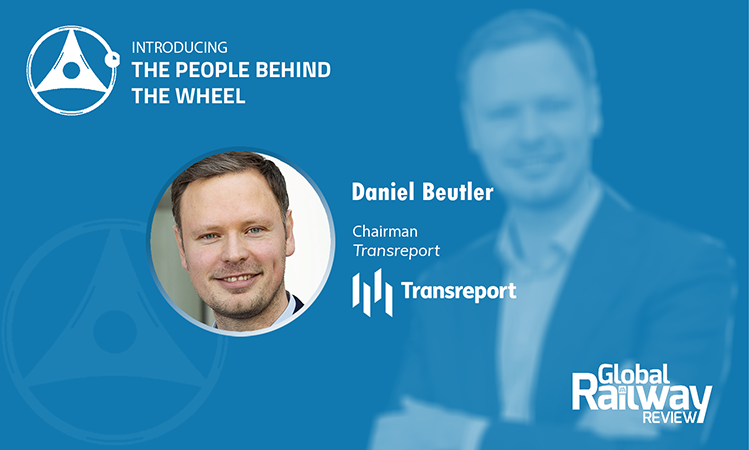

Can you tell us a bit about your new role at Transreport?
The Chairman role in a start-up environment extends far beyond the role you would imagine in a big corporation. My role primarily encompasses three key areas, with the first being the strategic vision to re-support the team. Obviously, I have relevant experience in transportation, with some contacts across different modes of transport. Transreport started on rail, but we’re going further now, especially into air. But why stop there?
Drawing from my background as CEO of Western Europe for Deutsche Bahn, I can offer experience in scaling businesses – critical in ensuring that structures put in place are scalable, whether it concerns technology, platforms, or teams and culture. It’s invaluable to work alongside individuals who have complementary experience, acting as a sounding board to ensure all perspectives are considered.
The next element in the strategic vision is everything around internationalisation. Going into new geographies and understanding what that means. Our diverse workforce, including our CEO, represents many cultures and nationalities, bringing a wealth of perspectives and ideas that drive our company’s success.
The second thing is linked to my coaching background. I am a Meyler Campbell-certified coach in London, and in this capacity, I work closely with the senior leadership team, especially the CEO, to take a step back, evaluate and support their decision-making processes. Empowering them to make the best choices is a core part of my role.
The third one, that’s probably the most classic one, I oversee governance and compliance, ensuring our operational integrity and that we meet all necessary compliance requirements.
What inspired you to seek a career in the transport industry?
I was always eager to understand what was happening behind the scenes, all that was taking place in the background for a big ship like that to set off, or equally for a train to depart or a plane to take off”
It’s a very personal story, but one I’m happy to share. I’m from Hamburg in northern Germany and my mother worked in the shipping industry. I grew up in the harbour environment and seeing these big vessels in one of the largest harbours in the world always gave me a sense of wanderlust. But for me, there was something more. I was always eager to understand what was happening behind the scenes, all that was taking place in the background for a big ship like that to set off, or equally for a train to depart or a plane to take off. I was fascinated by this from a very young age.
Hamburg is the third biggest aviation hub, and it has the third largest railway station in Europe. Wherever you go in Hamburg, transportation plays an important role.
Very early on I knew that transportation was what I wanted to do and today, it’s still my passion. I have held senior positions at both corporate companies and in the start-up world, all in global transport markets.
I need to work in something where I feel I can make an impact. I need to work in an industry where I can make a difference in what I’m doing and that’s about inclusion. I believe we have a big opportunity, almost an obligation, to ensure that the impact we have on society is a positive one. One where accessibility continues to go in the right direction.
Broadly speaking, accessibility concerns disabled people, but it also includes older people and those who are temporarily experiencing accessibility difficulties. I’m thinking of parents with small children and those who are coming out of hospital or experiencing illness and so on.
When considering a new position, I always start by speaking to the CEO to understand the culture. Does it align with my values? Is it a topic I’m passionate about? The third step is to test the product. When Transreport gave me a demo of their Passenger Assistance App, I was truly impressed.
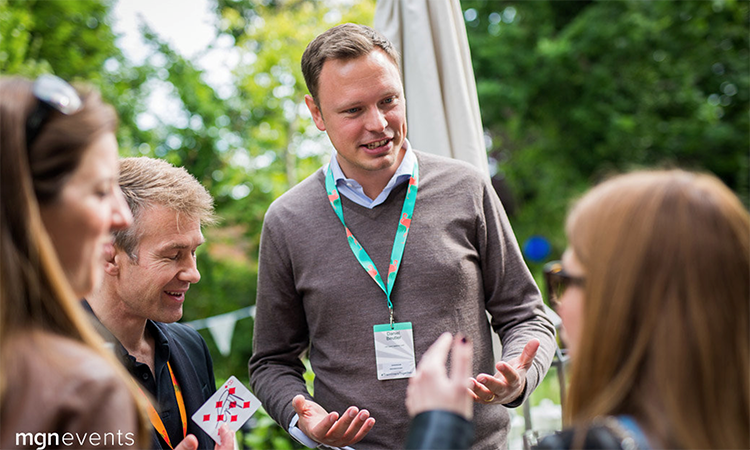

Credit: Transreport
Did a career in rail change your perception of the industry as a whole?
There are so many passionate people in the rail sector and the interesting thing is that they will never leave the industry… This industry gets into your bones”
100%. Rail has had a profound impact on my career and professional identity.
There are so many passionate people in the rail sector and the interesting thing is that they will never leave the industry. Some of them might leave for a short period, but they come back, and you will find them in different roles and at different companies. This industry gets into your bones.
One of the most important things that I really understand is that you won’t be able to change, or to make any change in the industry, other than from within. You need to have that understanding of how the industry works in a way that you only can from working within it.
One of the things that impressed me from the beginning about Transreport is their understanding of this.
When introducing the international online ticket for the first time in Europe, while working at Deutsche Bahn back in 2009, it naturally was a pivotal moment. However, while it was available to the public to use, we had a realisation that perhaps we hadn’t considered all elements, such as training the on-train teams who to validate the new technology.
This is where Transreport differs – as they consider every user and the potential demands they might have, from the passengers to the operations teams. Transreport has one app for the end consumer, and another for operations which is crucial in order to enable the travel companies and the operators to handle requests effectively and be part of the solution.
Rail is very domestically driven, with so many different regulations. For instance, when you compare National Rail with Deutsche Bahn or SNCF in France, you’re looking at completely different systems. In contrast, airlines like British Airways and Lufthansa may be different companies, but they operate similar planes and serve comparable destinations. This uniformity doesn’t exist in rail, which requires a deep understanding of how each country operates, along with an appreciation for those differences.
Rail has one of the most complex infrastructures, but notably one that wasn’t built with accessibility in mind. Today, we’re hindering so many people from daring to travel freely. The reality is that changing every single station is not something that happens overnight. This is why technology is so important. Transreport’s Passenger Accessibility App is an example of how technology can bridge this gap, offering a solution that is already making a real impact.
How do you see innovation shaping your role and the rail industry in the next five years?
I believe the next five years will probably be the most important the transport industry has ever seen, especially in rail. Five years ago, I wrote a piece in your magazine on artificial intelligence (AI) saying how important AI is going to be today. I re-read that article and I thought, well, that’s kind of what happened. 15 years ago, for me, it was all about the international online ticket system. Five years ago, most people had to look it up what AI even was. I think now we have the next tendency.
Now, when we talk about accessibility, we’re not talking about a niche issue anymore. In the next five years, we’re talking about at least 1.5 billion disabled people around the world”
Now, when we talk about accessibility, we’re not talking about a niche issue anymore. In the next five years, we’re talking about at least 1.5 billion disabled people around the world. We’re talking about more than 100 million people in Europe being older than 65 years of age. Just imagine if half of those people have an issue in travelling or accessibility! That is a huge number. We’re not talking about a niche anymore. Therefore, we need to address accessibility otherwise we’re hindering their freedom of movement and that’s unacceptable. This needs to happen now.
To date, our Passenger Assistance app has facilitated over two million customer journeys, significantly improving travel for Disabled and older people. In the UK, we won’t change the infrastructure, but we can add two things. The first is ensuring what I would call full freedom. For people who require assistance, we’ve brought the pre-booking time down from 24 hours to two hours. In the future, it should be like that across all modes of transport and ideally improved to the point where you can just show up.
I’m a father and I lived in Paris. As a parent, I have personally experienced challenges in navigating transportation with a pushchair, it’s impossible and reinforces the importance of inclusive design. For me, this was temporary as naturally my son learned to walk. But if you’re disabled, if you’re over 65 years of age, you’re effectively being excluded from society.
Often transportation is measured in a cost component and in an efficiency component above anything else. If we focus on efficiency, in the last year UK transportation companies lost £50 million due to delays. If we could ensure people requiring accessibility can get on and off their transport mode more easily, there’s potential to reduce that figure. This is in the interest of the passenger, but also the operator. This would benefit both passengers and operators, making freedom and efficiency key drivers for improving accessibility while reducing costs for transport companies.


Credit: Transreport
Suppose you were tasked with solving one of the biggest challenges in the rail industry today using cutting edge technology. What challenge would you address and what innovative solution would you propose?
It’s very easy to serve on the wave of success of things that are already there. To reinvent the wheel and implement something for the very first time is the real challenge, but that’s where the greater fun lies!
For me, one of the biggest challenges in the rail industry is undoubtedly accessibility. Everybody talked about disabled people when the Paralympics are being held. Everybody talks about demographic factors such as pensions all the time. But nobody puts all of that together and considers the real issue affecting disabled and older people on a daily basis.
When accessibility is viewed purely as a cost factor, it becomes dehumanising. This is where we believe technology can step in – to reintroduce the human element and restore freedom of travel”
When accessibility is viewed purely as a cost factor, it becomes dehumanising. This is where we believe technology can step in – to reintroduce the human element and restore freedom of travel. So, how are we doing this? I see six big factors.
As I mentioned earlier, the existing infrastructure wasn’t designed for today. Equally, you need to be digital. The actual process to ensure accountability, ensuring that somebody picks you up at a certain point, is really important now.
Secondly, we’re doing it with the industry, not against it. We can now go into different industries, to different countries, to understand what we can learn from them. Some places, whether airports or rail, have already set high standards, refusing to accept inequality in how people are treated. We need to ensure this standard is met everywhere for the communities we serve.
And then there’s a third aspect: technology. Cutting-edge tech is important, as is partnering up with prestigious organisations. We also have some experience there. For example, we’re working with the Hankyu regional rail network in central Japan right now. The Japanese rail industry is working to a different type of standard. Japan is setting the bar equally high for their technology.
In a way, it helps us to see what is out there and the technology available that we can use and put into our rail network. Sometimes you take the best benchmark and you put it into your product, be it on lifetime or real-time data.
Fourthly, big data will be so important because companies themselves don’t have enough information on their travellers today. Collected and utilised effectively, this information on so many customer groups across so many industries and transport modes, is invaluable. It can allow us to make the product even better.
Every company has a tendency to develop things on estimation at times, but ultimately we need to be data-driven, investing time and resources where we know it will truly make a difference.
The fifth factor is scalability We cannot reinvent the wheel for every new company we work with, for every new industry, for every new geography, so our platform must be scalable to meet diverse needs across markets.
What I want to achieve as any operator wants to provide is the best user experience that you can imagine. If you haven’t downloaded the Passenger Assistance App, I really recommend doing so. It is one of the best apps I have personally used, and that’s exactly how it should be, so that even the operator says, wow, that is remarkable.
And then the last thing is rolling it out. To date, over 140,000 people have downloaded the app, which is a great start.
Not only are we funded, but we do have experience. We have great people who know what they are doing. In addition to myself, we also have two other very senior people joining Transreport, namely Carmine Chiuchiolo as Senior Vice President (SVP) of Global Revenue and Jim Beattie as Chief Technology Officer (CTO).
Finally, in an ideal world, how do you envision the future of rail evolving?
We need to embrace and appreciate innovation, working hand in hand with transport operators and disability groups to harness the best that technology and innovation can bring”
This is my favourite question. I remember when I got into rail, rail wasn’t sexy at all and everybody said, “Trains, Daniel, are you serious?” I was the one persuading others, but now we’re seeing a renaissance of the train. Everybody has understood that rail is the solution,
the ‘go to’ mode of transportation, if you will.
When I travel, I always consider rail as my first choice of transport. It is particularly interesting that people have started to think like that in wanting to get from A to B.
We need to be working together. Innovation takes a long time to roll-out. We need to embrace and appreciate innovation, working hand in hand with transport operators and disability groups to harness the best that technology and innovation can bring.
Demand won’t go back to what it was before the pandemic, at least in terms of commuting. It’s very clear to see on Fridays commuting in Greater London, for example. But that presents a huge opportunity because there is capacity which needs to be filled.
As we look ahead, Transreport remains committed to leading the charge in inclusive transport innovation and rail as an industry has such a great future. If you look at Spain, Italy and China, you can see what can happen if you put a great quality of trains on fast tracks with good service and accessibility around that. If you take Milan, for example, it’s incredible to compare it’s figures by air to rail today. If you can then combine that with technology, such as what Transreport provides, the future is real.


OUT NOW: The Definitive Guide to Rail’s Digital Future
The rail industry is undergoing a digital revolution, and you need to be ready. We have released our latest market report, “Track Insight: Digitalisation.”
This is not just another report; it’s your comprehensive guide to understanding and leveraging the profound technological shifts reshaping our industry. We move beyond the buzzwords to show you the tangible realities of AI, IoT, and advanced data analytics in rail.
Discover how to:
- Optimise operations and maintenance with real-time insights.
- Enhance passenger services through seamless, high-speed connectivity.
- Leverage technologies like LEO satellites to improve safety and efficiency.
Featuring expert analysis from leaders at Nomad Digital, Lucchini RS, Bentley Systems and more, this is a must-read for any rail professional.
Related organisations
British Airways, Deutsche Bahn, National Rail, SNCF, Trainline, Transreport




